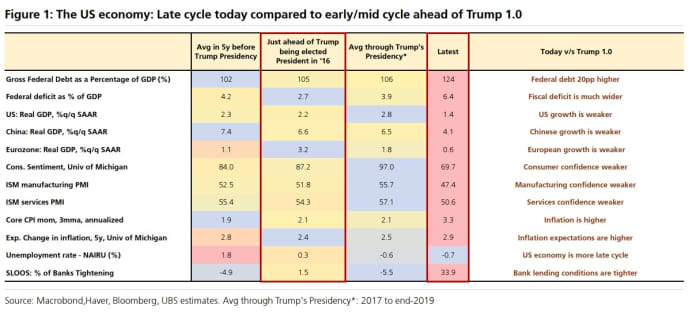That’s a mistake investors are making when thinking about a second Trump term, UBS strategists said.

Former Republican President Donald Trump won the Iowa caucuses and the New Hampshire primary, and is ahead of Nikki Haley by a significant margin in South Carolina, where Haley was governor from 2011 to 2017.
So it is highly likely that Trump will become the Republican presidential candidate, and depending on which betting site you look at, it is a coin toss that he will become president again.
Looking at these possibilities, UBS strategists led by Bhanu Baweja in London said investors may be making the mistake of expecting the first Trump term to be the second.
In the first 36 months of Biden’s presidency, the S&P 500 SPX index is up 31%, compared with 41.5% during Trump’s first three years in office and 58.9% during Barack Obama’s first three years, according to data from the website Macrotrends.
“Most investors we spoke to seemed to view the 2016-17 experience as a sample of how markets would behave if Trump wins. This is a very optimistic view on the stock. “We believe this consensus significantly underestimates how different the starting points are for the U.S. economy, stock markets, and the broader risk premium,” they say.
The UBS team said the reason was due to current market and economic conditions rather than an evaluation of Trump’s policies. “The economy is much later in the cycle. Fiscal space and bond market patience are likely running out. Return expectations are higher, and perhaps most importantly, risk premiums are already much tighter,” they say.
They created this chart to show the differences between different factors now.

When it comes to policy, the UBS team expects Trump’s 2017 tax cuts to be partially extended. If the Trump tax cuts are fully extended, marketable debt as a percentage of GDP will increase.
They say the brute response of financial markets is to initially favor Republicans winning both the presidency and Congress, but the markets have given back some of those gains, averaging about a 6% gain over a 12-month period. In contrast, Democratic landslide wins tend to have smaller three-month results but better 12-month results.



